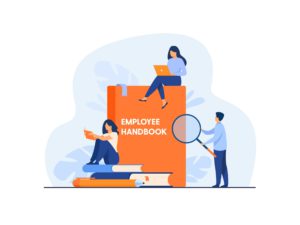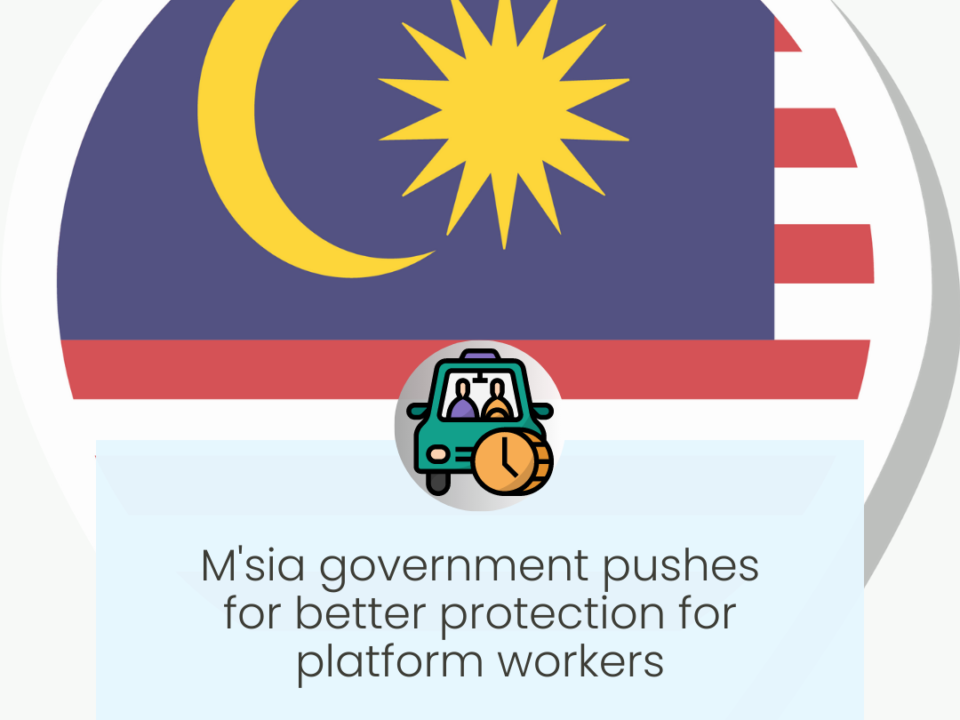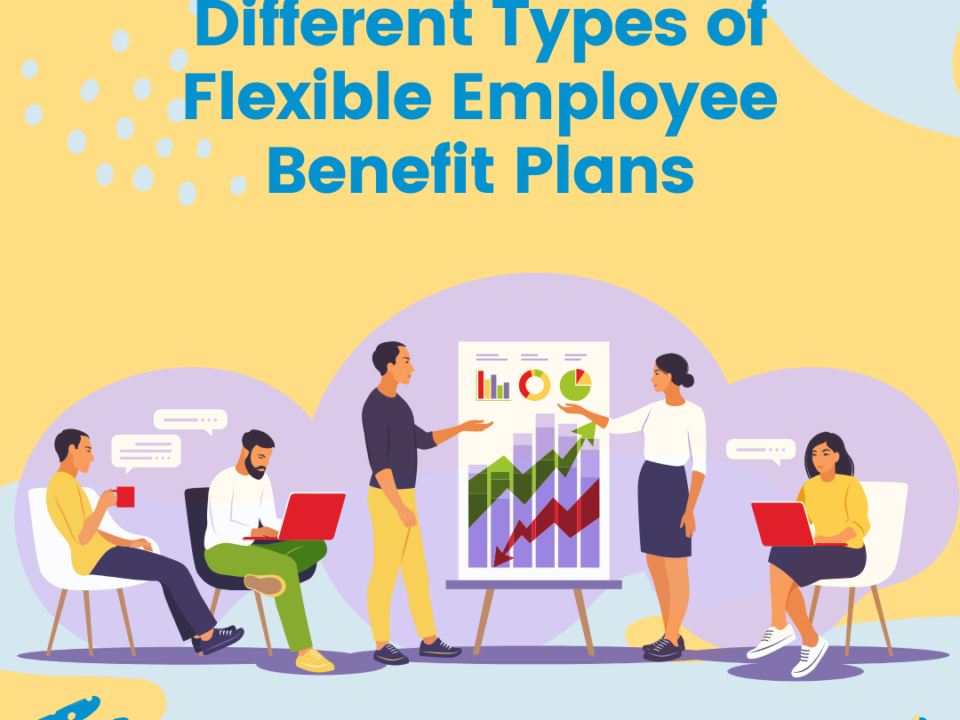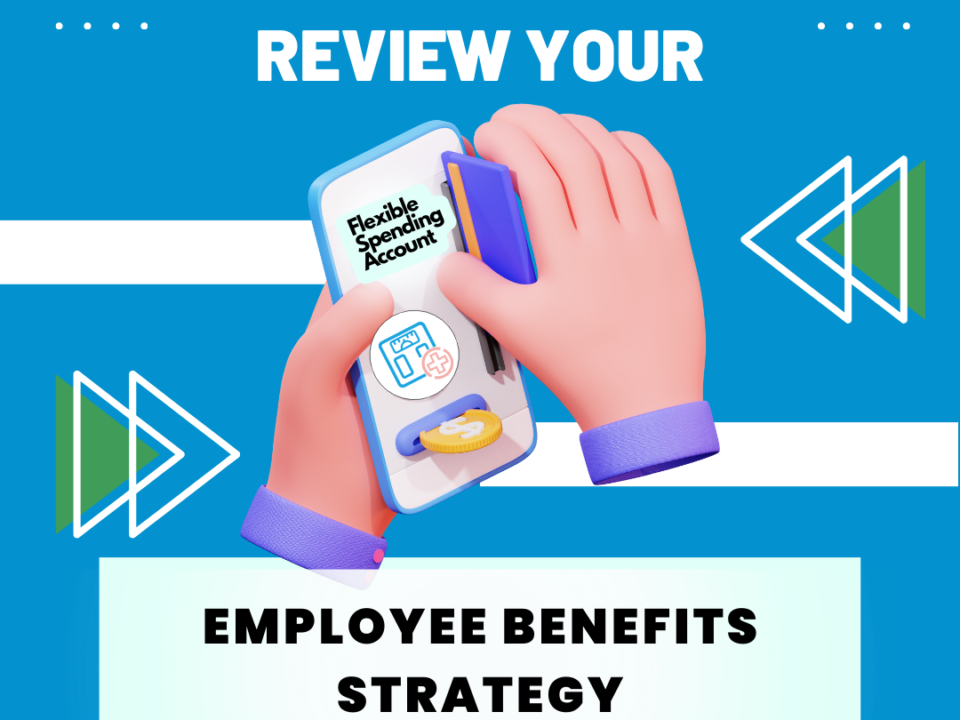
Mednefits is ISO 27001 certified
October 31, 2022
The ultimate guide to employee benefits in Malaysia
November 7, 2022Covid-19 – Everything You Need to Know
General
Covid-19 - Everything You Need to Know
November 1, 2022

What are the HR Trends since Covid-19?
According to David Pooi, an HR Tech Advocate & HR Educator in Singapore, the Covid-19 pandemic has exacerbated what we've always known to be true — that HR is the workplace transformation agent.

And now, we're facing two big transformations.
#1. HR leaders are turning to technology to support their employee experience initiatives
HR professionals have always been working on providing the best employee experience. Whether it's introducing new health & wellness initiatives, valuing existing benefits, or enhancing compensation structures.
What's interesting is that HR leaders are now leaning towards HR Tech to make their processes more efficient and reduce repetitive tasks.
The good news is that many HR tech solutions are free during this pandemic. The solutions have disrupted the HR industry and pushed digitalisation forward.
#2. Employees are concerned about job security
On the other side of the spectrum, you have employees who are concerned about the business' performance, which is tied to the security of their jobs. This is where employee engagement becomes even more important, and where many HR technologies come into play.
We're seeing employees who are impacted in sectors such as Retail, Hospitality, F&B and Construction, sending employees for re-skilling, and many who have attended David's workshops (like HR Mindsets & Behaviours, and Driving HR Innovations) used the opportunity to learn about sought-after skills like HR Technologies, HR Analytics and Digital Transformation. We have also seen many HR professionals, managers and executives signing up for David's Specialist Diploma in Enhanced HR Skills to upskill during this time – virtually, of course.
How Covid-19 caused the rise of health issues and what can HR do about it?
The Covid-19 pandemic has forced nearly every employee to work from home and stay in isolation. Employees discuss their projects on Zoom. They are connecting with their families on WhatsApp video calls. The boundary between work and life has blurred so much that employees are working overtime nearly every day.
What do you think this leads to?
Rising physical and mental health issues.
Employees are having a difficult time working from home without the right support and feeling disengaged. Yes, all of us are trying to find better ways to address these issues brought along by Working from Home (WFH), and solve them effectively with technology.
This could simply be checking in more often with one another using video calls, having scheduled meetings to check in on the well-being of employees, or supplying the resources that encourage better health and wellness, such as online counselling, or fitness sessions.

How do employers cope with the Covid-19 impact?
#1. Reevaluate the employee benefits package
The Future of Benefits 2020 study by Hartford has shown that employers are likely to offer new additional benefits and services and update their packages to align more closely to their employee benefits needs.
But how do you find out what benefits your employees truly desire? This guide can help you determine the right benefits to add, expand, or reduce.
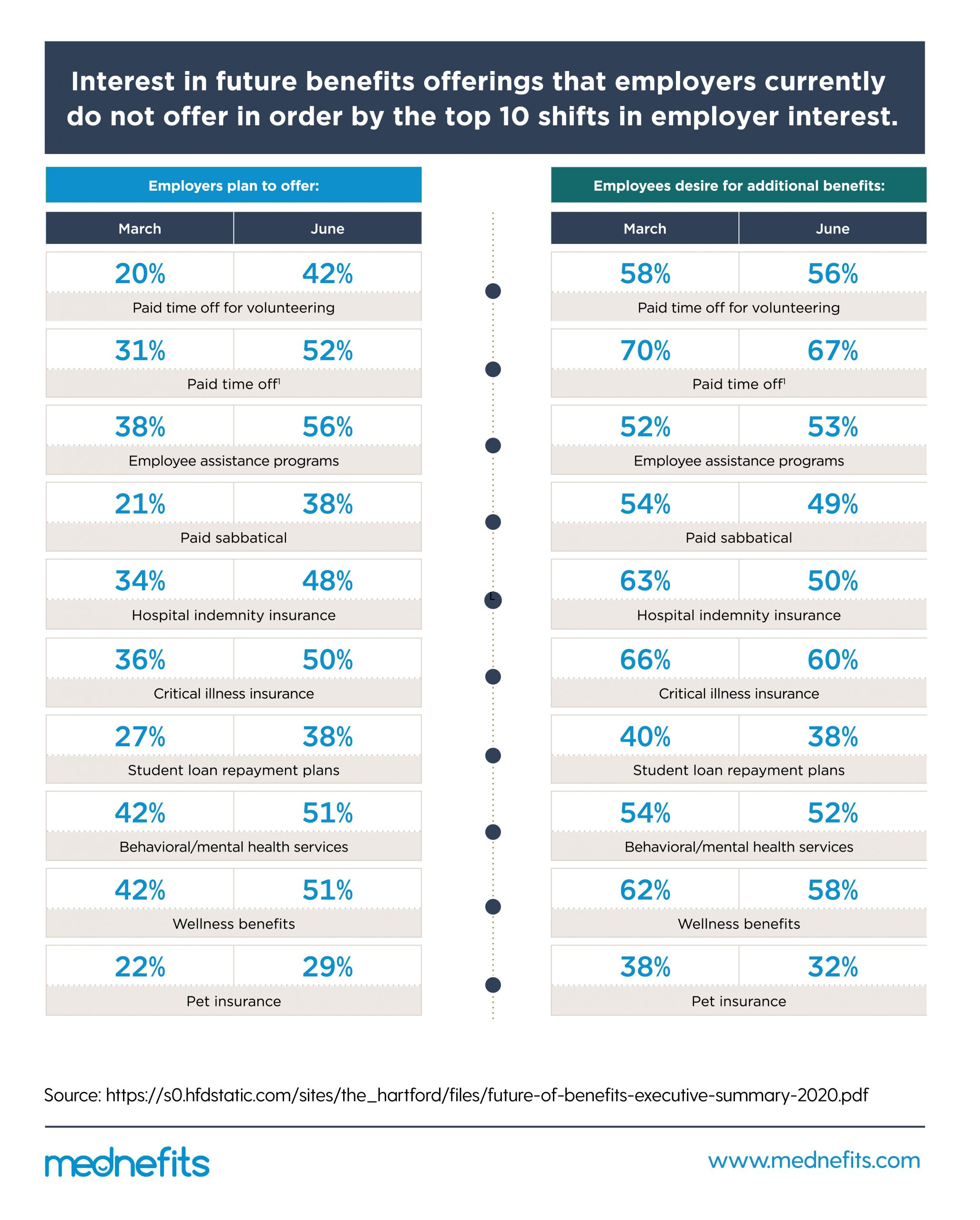
#2. Increase work flexibility and making remote work permanent
PWC's US Remote Work Survey shows that 56% of 133 executives are heading toward a hybrid office workweek, even after the pandemic is over.
Employers believe that providing employees with a flexible schedule is important because it will help enhance their mental health. That makes them more productive in their jobs.
Related reads: How to Engage Remote Employees - 5 Strategies Backed by Science
#3. Improve child care and senior care benefits
Believe it or not, 63% of employers plan to offer increased child care benefits and 41% provide better senior care benefits.
Child care, especially, are shifting from on-site care to flexible care benefits such as:
- paid memberships to online platforms to find care
- personalised counselling or planning
- new parent support
- cash subsidies for care
- in-home backup child care
This shift gives parents more control in their choice of care options.
#4. Expand telemedicine programmes
Health care is costly, and telemedicine programmes are one way to save money.
Covid-19 has forced employers to search for digital and online medical services to balance economics and empathy to provide meaningful healthcare and maximise return on investment.
This trend has caused 47% of insurers surveyed in Asia to offer telemedicine programmes (a 15% growth from 2019). And 22% cited that they're planning to initiate telemedicine within the next 2 years.
Besides insurers and employers, 40% of millennial employees reported that the telemedicine option was "extremely or very important". They are more likely to shop around and research healthcare options than baby boomers, the Health Care Survey showed.
#5. Enhance emotional and mental health services
The importance of emotional and mental health benefits is becoming more evident amid the Covid-19 pandemic.
Employees are seeking this service because it helps them manage their stress better and feel secure at work, increasing their productivity.
The advantages for employers include lower healthcare costs from stress-related illnesses such as heart disease or depression; higher employee retention rates which lead to reduced recruitment and training costs.
Indeed, 70% of employers plan to invest in mental health resources by starting, continuing, or expanding benefits in 2021.
The most common reasons for expanding support are to promote employee productivity, increase satisfaction, and attract talents.
But adding and expanding employee benefits won't be enough unless your employees know about their existence and take advantage of them -- which brings us to the next point.
Related reads: 5 ways to talk about mental health at work
#6. Educate employees about different benefits tools and platforms
The way employers educate their workforce about benefits and facilitate enrollment is also changing.
63% of employers said their company's open enrolment strategy would depend more strongly on online resources this year.
Some employers also plan to offer online enrollment in several ways, such as:
- An all-online benefit education and enrollment experience
- Ability/access to enrol in benefits during and outside of business hours
- Enrol benefits in person with an HR
- Enrol in benefits with a virtual assistant/bot
- Telephonic enrolment
Not surprisingly, 52% of employees also expressed interest in an all-online benefits education and enrollment experience. But what might surprise you is that more than half of the employees said they would like a personalised recommendation of the benefits they should use.
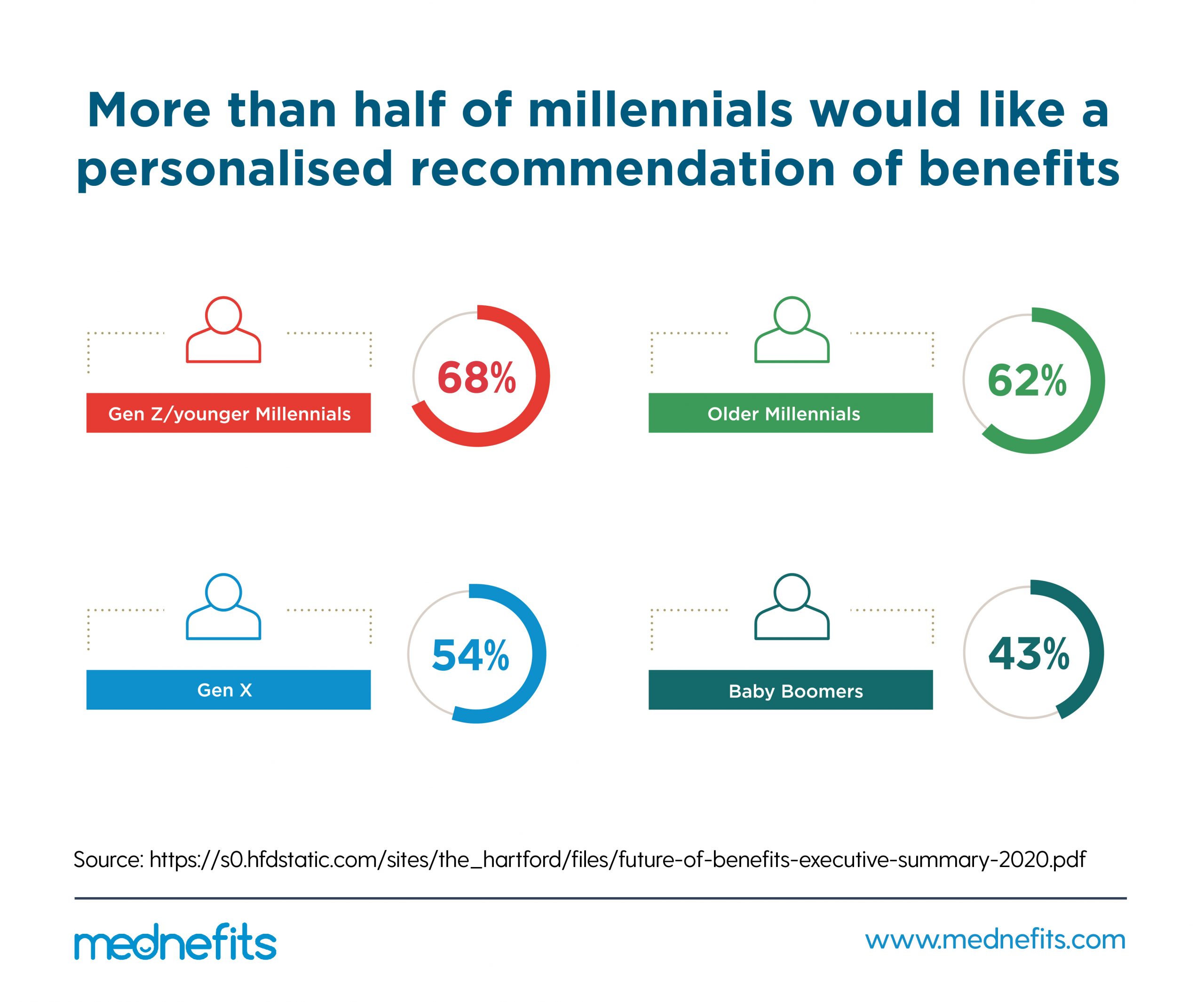
If you're planning to make your employee benefits more flexible and personalised, schedule a consultation call with our Benefits Specialist team and learn how to transform your compensation structure with the least effort.
#7. Offer incentives to boost vaccination rates
Although there is no legal guidance about appropriate incentives to encourage employees to get the vaccine, over 50% of organisations already offer paid time off to employees.
Here are 3 examples of how companies offer different incentives:
- Kroger provides a one-time payment of $100 to all associates who receive the full manufacturer-recommended doses of the Covid-19 vaccine.
- Amtrak allows excused absences for employees receiving vaccinations during their working hours and paying them an allowance equivalent to 2 hours of work when they submit documentation of receiving the vaccine. In addition, employees who miss working more than 48 hours due to vaccine side effects will have their absence excused and get paid.
- Knead Hospitality + Design restaurant gives bonus paid time off for employees who submit written documentation to their general managers.
#8. Employees are willing to exchange salary for paid time off
Perhaps, Covid-19 has taught the workforce how important it is to pursue endeavours they personally consider meaningful — while they're still alive.
Over one-third of employees are willing to give up a portion of their future earnings in exchange for paid time off to volunteer or do the things they love. 44% of them said they would give up at least 10% to 20% of the pay raise if they get unlimited vacation time.
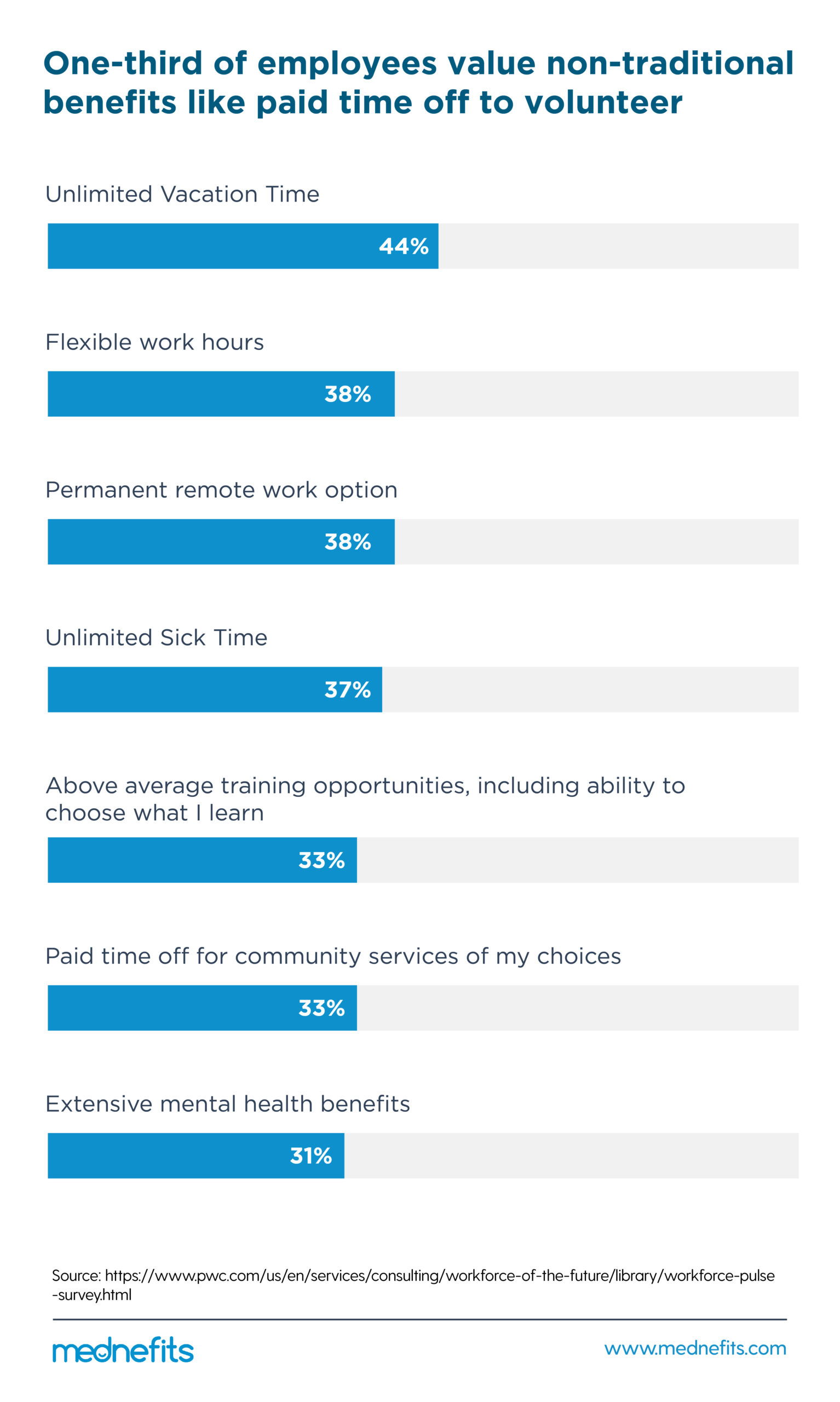
#9. Expand data collection on employees
A Gartner analysis shows that 16% of employers use technologies more frequently to monitor their employees through methods such as virtual clocking in and out, tracking work computer usage, and monitoring employee emails or internal communications/chat.
While some companies track productivity, others monitor employee engagement, well-being, and benefits usage to better understand employee experience.
#10. Provide financial wellness benefits
Last but not least, one pervasive worry that has been amplified during the pandemic is financial stress. A PwC survey found that 58% of stressed employees said finances had been a distraction at work.
It's no wonder that nearly 60% of employees feel it is more important now than ever that employers offer financial wellness benefits due to the Covid-19 pandemic.
Statistics show that employees participating in company-sponsored financial wellness programs are more likely to commit to their employer long-term. It also boosts the employees' productivity and willingness to go above and beyond.
Examples of financial wellness benefits include:
- Retirement plans
- Student loan repayments
- Flexible paydays
- Personalised financial advice programmes (e.g. teaching employees how to pay down debts)
Related reads: How to attract and retain employees - The complete guide.
Wrapping it up
The Covid-19 pandemic has changed the way employers and employees view benefits. Multiple surveys have shown continued employer support is necessary to ensure employees stay safe, sane, and productive.
As a result, most companies are now reevaluating their current benefit packages to ensure they’re providing the best possible support for all of their employees.
It is important to understand how this change may affect your employees’ work and life and what you can do in response to these changes.
About Mednefits:
Mednefits helps businesses take care of their employees with its automated, affordable, and accessible employee benefits platform.
Request to join Mednefits for free to help process and track claims in real-time, while controlling costs.



